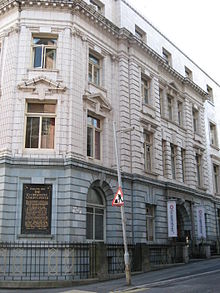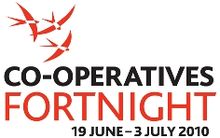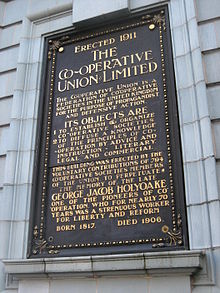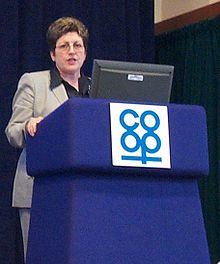- Co-operatives UK
-
Co-operatives UK 
Type Co-operative Federation Founded 1870 Headquarters Manchester, United Kingdom Area served United Kingdom Key people Ed Mayo Industry Trade association Members 505[1] Employees 31[2] Website uk.coop Co-operatives UK is "the central membership organisation for co-operative enterprise throughout the UK",[3] a co-operative federation founded in 1870 as the Co-operative Central Board, before changing its name to the Co-operative Union[4] and finally becoming Co-operatives UK following its merger with the Industrial Common Ownership Movement (ICOM) in 2002.[5] Historically associated with the consumer co-operatives, the merger broadened its scope to include worker co-operatives and it now exists to support and promote the values of the co-operative movement throughout the UK.[6]
During its history, it has been responsible for the organisation of the Co-operative Congresses, the establishment of both Co-operative Commissions and the creation of the Co-operative College and the Co-operative Party.[7] Its head office is Holyoake House, a Grade II listed building in Manchester built in 1911 in memory of the co-operative activist George Jacob Holyoake,[8] and its membership includes organisations as diverse as the Woodcraft Folk, the Co-operative Group and the Oxted School Young Co-operative. It is controlled by a board elected by its membership, is a member of the International Co-operative Alliance (ICA), the trustee of the Co-operative College, and retains a nominated seat on the National Executive Committee of the Co-operative Party.[7]
Contents
Modern organisation
The modern organisation began to take shape when Dame Pauline Green became the first female chief executive of the Co-operative Union on New Year's Day 2000.[9] Practically her first action in the position was to write a letter - co-signed by Lord Graham of Edmonton, Graham Melmoth, and Len Fyfe - to then Prime Minister Tony Blair for his help in creating a second Co-operative Commission, to help revitalise the Movement for the next century.[10] Green served on the Commission - chaired by John Monks[11] - and then took the job of co-ordinating the Union's response to the final report.[12] The Union began a "deliberate attempt to secure and celebrate [the] co-operative advantage", forming closer ties with other organisations across the Movement in an attempt to create the "first ever 'all movement' Co-ordination Movement".[13]
The fruit of these closer ties was an increased visibility and role for the Union in the Co-operative Movement.[14] The Union began providing administration services for the United Kingdom Co-operative Council (UKCC) and the Industrial Common Ownership Movement (ICOM) in 2000,[13] which ultimately led to the UKCC deciding to wind up and allow the Union to take over its functions, and ICOM merging with the Union[15] to bring together the retail and worker co-operative sectors for the first time since they split in 1880.[16] The two groups members voted their agreement to the merger in the Autumn of 2001, and ICOM brought its staff and membership to the Manchester offices of the Union when the merger was formalised[17] in December 2001.[18]
The organisation went through a two year transitional period[17] before its members voted in December 2002 to rename it Co-operatives UK.[5] The new identity was launched in January 2003, with Green calling the change "our way of showing that the Co-operative Movement now has a single strategic voice in the UK"[19] and using the opportunity to push the revitalised organisation into developing new services and vigorously promoting the values of the Co-operative Movement.[6] A "New Ventures" panel was established to promote new co-operative ideas, a Corporate Governance Code of Best Practice was published to help promote good practice[20] and the Union began encouraging its members to report on Key Social and Co-operative Performance Indicators to demonstrate their commitment to co-operative ethical principles.[21] All three initiatives were recommended by the Co-operative Commission to assure the future of the Co-operative Movement.[22]
Green announced that she intended to retire as chief executive of the organisation in 2009, saying: "I will be 60 at [that time] and I have always intended to retire when I reached that milestone. The Board [of Co-operatives UK] and I agreed that it made sense for me to finish after Co-operative Congress 2009, which is, to all intents and purposes, the end of our co-operative year."[23] In July 2009, it was announced that Ed Mayo would become Secretary General of Co-operatives UK, resigning as Chief Executive of Consumer Focus to take up the post.[24] He took up the position officially the following November.[25]
Co-operatives UK continues to work on behalf of the Co-operative Movement as a whole, opposing recommendations from the International Accounting Standards Board (IASB) that would have seen co-operative members' share capital classed as debt and "destroyed" the co-operative advantage,[26] responding to a Government consultation to amend the Industrial and Provident Societies Act 1965 and encouraging their members to do likewise[27] and gathering information on the scope and scale of the UK Movement, maintaining a searchable directory of UK co-operatives on its website.
Co-operatives Fortnight
In 2010, Co-operatives UK co-ordinated the UK's first ever Co-operatives Fortnight, running from 19 June to 3 July. The fortnight was marketed as an opportunity to promote the co-operative alternative - under the slogan "There is an alternative" - to tradition business models, and included over 150 events in every region and devolved nation in the UK, over 3,000 stores promoting the Fortnight nation-wide and over 4,000 people watching the Co-operatives Fortnight film. During the Fortnight, 13 co-operative schools were also established and two parliamentary motions were passed in Westminster and Edinburgh.
The event was made possible by eight "founding sponsors": The Co-operative Group, The Midcounties Co-operative, Midlands Co-operative Society, Anglia Regional Co-operative Society, The Southern Co-operative, Chelmsford Star Co-operative Society, Lincolnshire Co-operative and Channel Islands Co-operative Society. Co-operatives UK are currently analysing the impact of the Co-operative Fortnight.
It was recently confirmed that Co-operatives Fortnight would continue in 2011, between 25 June and 9 July. This year's theme will be "Yours to Share".[28]
History
Foundation
During the resurgence in co-operation following the successes of the Rochdale Pioneers and the Co-operative Wholesale Society (CWS), the Co-operative Movement began to lift itself out of the decade of society failures between 1834 and 1844.[29] The success brought pride but also anxiety for the movement's leaders as they began to fear that societies might forget their co-operative ideals in the face of material success. The solution, it was decided at the first of the modern Co-operative Congresses, was the creation of a national organisation that could hold the movement together and emphasise the important role that co-operatives could play in society at large.[30]
The Co-operative Central Board was established in 1869, before changing its name to the Co-operative Union,[4] and spent the first 40 years of its existence operating out of a variety of rented premises in the Long Millgate district of Manchester.[8] Its purpose was described "propagandist and defensive action" and it listed the objectives of establishing and organising co-operative societies and provided advice and instruction on the co-operative principles.[31] These educational activities were formalised first in 1882 with the creation of the education committee and then in 1919 when the Co-operative College was created.[8]
The initial intention of the Union was that it would support and promote the interests of worker co-operatives but, given the number and financial strength of the consumer co-operatives, these soon began to dominate the organisation.[32] Ultimately, this led to the splitting of the worker and consumer sectors of the UK Movement, prompted by the CWS' rejection of the idea of profit-sharing with its employees in 1880.[16] From that point the Co-operative Union became an organisation that predominantly dealt with co-operative retail societies.[33]
Holyoake House
In 1906 the co-operative activist George Jacob Holyoake died and the Co-operative Movement decided that to commemorate him by building a permanent headquarters for the Co-operative Union. The building was designed by architect F. E. L. Harris, who had also designed the nearby CWS building in the year of Holyoake's death. It was erected in 1911[34] on Hanover Street[35] (also home to the Co-operative Bank[36]) and named Holyoake House.[8] A plaque was erected outside the building dedicating the building to Holyoake's memory, reading:
This building was erected by the
voluntary contributions of 794
Co-operative Societies members
of the Union to perpetuate
the memory of the late
George Jacob Holyoake
one of the pioneers of Co
-operation, who for nearly 70
years was a strenuous worker
for liberty and reform.
Born 1817. Died 1906.[31]Holyoake House is also home to the Co-operative College (although between 1940 and 2001, the College moved to Stanford Hall, near Loughborough),[8] the Association of British Credit Unions Limited (ABCUL)[37] and The Co-operative News.[38] The building was extended in the 1930s,[8] and the Training Centre on the top floor was destroyed by an incendiary bomb in the Manchester Blitz of 1940.[39] A collection of Holyoake's letters, papers and other writings are held in store in the National Co-operative Archive, also housed in the building,[40] whilst the building itself received Grade II listed building status on 20 June 1988.[41]
Promoting the Movement
As well as its responsibility for organising the annual Co-operative Congresses, the Co-operative Union had a wider responsibility for promoting co-operation throughout the UK and worldwide.[42] During the First World War, the Movement began to feel hostility from the Government: requests to set up a system of rationing to prevent private traders from hoarding goods and selling them at inflated prices were initially ignored and then, when sugar rationing was finally introduced, the Union was refused a seat on the commission set up to control it although co-operatives were the largest wholesalers and retailers of sugar in the UK. A motion was put forward to the 1917 Congress to abandon the principle of political neutrality and when it was passed The National Co-operative Representation Committee was formed.[43] Its purpose was to represent the views of the Co-operative Movement in Parliament and it was soon renamed the Co-operative Party,[44] funded by individual societies within the Movement.[45]
The Union was also responsible for the establishment of the Independent Co-operative Commission (sometimes called the Gaitskell Commission after its chair Hugh Gaitskell). During a period of dramatic change in the retail landscape the Union's Central Executive held discussions with the CWS, the Scottish Co-operative Wholesale Society (SCWS) and the Co-operative Production Federation before introducing a motion to the 1955 Congress empowering them to establish an inquiry commission "charged with the responsibility of surveying the whole field of co-operative production and marketing, both wholesale and retail". It submitted its findings to the Union for presentation at the 1958 Congress. The Union met the costs of the commission and made its own submission of evidence.[46] The report made 51 recommendations on a variety of issues but failed to have significant impact on the movement, the Co-operative Union concluding in its 1967 Regional Plan that "If the serious warnings of the Independent Commission had been heeded, the Movement would be in far better shape to withstand the impact of new problems which have developed".[47]
Changing environment
Through the end of the 1960s and the start of the 1970s the working environment of the Union began to change: Britain joined the European Economic Community (EEC) and so closer ties with the ICA were necessary. The retail industry was changing and the Union published its Regional Plan advocating reduction of the number of retail societies (to a "manageable" figure of 50) through mergers. The CWS began taking over some services the Union had traditionally offered, such as its trade Advisory Service, so that the Union had to re-examine and refocus the services it offered its members.[48] On 10 August 1974 it also suffered a serious setback when its newly appointed General Secretary Clarence Hilditch died in office.[49]
Governance
Co-operatives UK is a co-operative enterprise, and hence controlled by its 470+ members through an elected board of directors.[50] The membership is made up predominantly of other co-operative enterprises - making Co-operatives UK a co-operative federation - but also includes other co-operative federations,[51] such as the ABCUL, the Plunkett Foundation and Supporters Direct.[52] It also has Co-operative Development Body (CDB) members, and associated and affiliated groups [51] who are not themselves co-operatives but are supportive of the Co-operative Movement and its principles, such as the Woodcraft Folk or the Building Societies Association.[53] A number of individuals who were members of ICOM before its merger continue to subscribe but are not recognised by the Rules. The membership is diverse, reaching from the world's largest consumer co-operative to Oxted School Young Co-operative, a co-operative set up by pupils to sell Fairtrade goods at the school.[54] Its board has 18 members, with places divided through the membership as follows:
- 9 seats for the Co-operative Group
- 1 seat for Midlands Co-operative Society
- 4 seats elected by Consumer Co-operative societies (one from each of four geographic regions: Scotland, the North, the Midlands and the South)
- 2 seats elected by Worker Co-operatives and Employee Owned Businesses
- 1 seat elected by the Co-operative Development Bodies
- 1 seat elected by the remaining membership
The current Chair is Ben Reid of Midcounties Co-operative.[55]
As well as its federal members, Co-operatives UK maintains links with other co-operative organisations: it is a member of the International Co-operative Alliance (ICA)[3] and the trustee of the Co-operative College,[56] and retains a nominated seat on the National Executive Committee of the Co-operative Party.[57]
General Secretaries and Chief Executives
General Secretaries of the Co-operative Union[58]
- Edward Vansittart Neale 1873-1891
- JC Gray 1891-1911
- Alfred Whitehead 1911-1929
- Robert Palmer 1929-1947
- Robert Southern 1950-1972
- Clarence Hilditch 1972-1974
- Lloyd Wilkinson 1974-2000
- Pauline Green 2000-2002, becoming Chief Executive of Co-operatives UK
Chief Executives of Co-operatives UK
- Pauline Green 2002-2009
- Ed Mayo 2009–present[59]
See also
- List of co-operative federations
- Lloyd Jones
References
- ^ Co-operatives UK (2010) (PDF/paperback), Co-operatives UK Annual Report 2009, Co-operatives UK, p. 35, http://www.uk.coop/sites/default/files/AR2009lores_0.pdf, retrieved 2010-07-20
- ^ Co-operatives UK (2010) (PDF/paperback), Co-operatives UK Annual Report 2009, Co-operatives UK, p. 15, http://www.uk.coop/sites/default/files/AR2009lores_0.pdf, retrieved 2010-07-20
- ^ a b "Co-operatives UK's web site". Co-operatives UK. http://www.cooperatives-uk.coop. Retrieved 2007-09-21.
- ^ a b UK Co-op Milestones, August 2003, archived from the original on 2007-09-28, http://web.archive.org/web/20070928205503/http://www.cooponline.coop/about_intro_milestones.html, retrieved 2007-10-19
- ^ a b Co-operatives UK (2002), Annual Report and Financial Statements 2002, Co-operatives UK, pp. 4–5
- ^ a b Mitchell, Graham (2003), "In With the New", Co-operatives 1: 18–19
- ^ a b See references in relevant sections of article.
- ^ a b c d e f Background, 2005, http://archive.co-op.ac.uk/background.htm, retrieved 2007-10-18
- ^ "in Brief: Green to Quit Strasbourg", Guardian Unlimited (London), 27 November 1999, http://www.guardian.co.uk/uk_news/story/0,,253157,00.html, retrieved 30 April 2010
- ^ Process and Overview, 2002, http://www.co-opcommission.org.uk/introduction/intro_fr.html, retrieved 1 October 2007
- ^ The Co-operative Commission: Choose a Commissioner, 2002, http://www.co-opcommission.org.uk/annexes/annex1.html#Anchor-Pauline-51540, retrieved 1 October 2007
- ^ co-operative union ltd annual report & financial statements year ended 31 december 2000, 31 December 2000
- ^ a b Green, Pauline (31 December 2000), "Chief Executive & General Secretary's review of the year", co-operative union ltd annual report & financial statements year ended 31 december 2000, pp. 8–9
- ^ Green, Pauline (31 December 2002), "Chief Executive & General Secretary's review of the year", Co-operatives UK Annual Report & Financial Statements 2002, pp. 5
- ^ Green, Pauline (31 December 2001), "Chief Executive & General Secretary's review of the year", co-operative union ltd incorporating ICOM - the worker co-op federation annual report & financial statements 2001, pp. 8–9
- ^ a b Davis, Peter (December 1999), "An Arsenal for Labour", Journal of Co-operative Studies 32.3: 231–233, archived from the original on August 30, 2007, http://web.archive.org/web/20070830231103/http://co-opstudies.org/Journal/December+99/arsenal_for_labour.htm, retrieved 2007-10-19
- ^ a b co-operative union ltd incorporating ICOM - the worker co-op federation annual report & financial statements 2001, 31 December 2001, pp. 7–8
- ^ Welcome: Introduction to Co-operativesUK Legal Services*, 31 August 2006, archived from the original on 2007-10-05, http://web.archive.org/web/20071005120642/http://www.cooperatives-uk.coop/Services/memberBenefits/legalServices, retrieved 2007-10-25
- ^ Co-operative Union becomes... Co-operatives UK, January 2003, archived from the original on 2007-11-23, http://web.archive.org/web/20071123025414/http://www.cooperatives-uk.coop/News/newsArchive/2003/co-operativeUnionBecomes...Co-operativessupuk/sup, retrieved 2007-10-25
- ^ Commission Paves the Way for Co-operative Success, 13 June 2005, archived from the original on 2007-10-31, http://web.archive.org/web/20071031044419/http://www.cooperatives-uk.coop/News/newsArchive/2005/commissionSuccess, retrieved 2007-10-25
- ^ Demonstrating Co-operative Difference, 12 January 2007, archived from the original on September 24, 2006, http://web.archive.org/web/20060924161139/http://www.cooperatives-uk.coop/live/cme211.htm, retrieved 2007-10-25
- ^ the co-operative advantage: Creating a successful family of Co-operative businesses, January 2001, http://www.co-opcommission.org.uk/pages/ch_intro_fr.html
- ^ Dame Pauline to step down as CEO in 2009, 6 October 2008, http://www.thenews.coop/news/Wider%20Co-op%20Movement/1435, retrieved 7 October 2008
- ^ Smithers, Rebecca (14 July 2009), "Ed Mayo resigns from Consumer Focus", The Guardian (London: Guardian Unlimited), http://www.guardian.co.uk/money/2009/jul/14/ed-mayo-resigns, retrieved 1 December 2009
- ^ Welcoming Ed Mayo, 2 November 2009, http://www.cooperatives-uk.coop/live/dynamic/News2ShowArticle.asp?article_id=08C471E2-2988-4912-AD04-94E4A9155114&id=0&cmetemplate=Co-operativesUK/dynamic_template.tmp, retrieved 9 November 2009[dead link]
- ^ Co-operativesUK Blocks Major Threat to Co-operatives Movement, 14 February 2005, http://www.via3.net/pooled/articles/BF_NEWSART/view.asp?Q=BF_NEWSART_131058, retrieved 4 October 2007
- ^ (– Scholar search) Response to HM Treasury Consultation on Cooperative and Credit Union Legislation, 13 September 2007, archived from the original on October 5, 2007, http://web.archive.org/web/20071005070425/http://www.cooperatives-uk.coop/Services/memberBenefits/promotingCo-operation/publicConsultations/ipsLegislationResponse, retrieved 2007-10-25[dead link]
- ^ Co-operatives Fortnight, http://www.uk.coop/about/fortnight, retrieved 2010-12-06
- ^ SOCIAL STRIFE: The birth of the Co-op - page 3, http://www.cottontimes.co.uk/co-op03.htm, retrieved 2007-10-19
- ^ The Co-operative Movement, http://www.thirdway.org/files/articles/coop.html, retrieved 2007-10-19
- ^ a b See the picture here
- ^ Birchall, Johnston (1997), The International Co-operative Movement, Manchester University Press, ISBN 0719048249, http://www.google.co.uk/books?id=91-ntLeoyckC&pg=PA40&dq=%22Co-operative+Union%22+consumer&ei=xMMYR9a5GY-K7QK38t3LBQ&sig=aa1j5L-Evpa22kNcWhBcMCbghqU#PPA40,M1, retrieved 2007-10-19
- ^ THE SPREAD OF CO-OPERATION, 2005, http://www.party.coop/90/history.php, retrieved 2007-10-19
- ^ Who Built What in Manchester?, Google, 6 January 2006, http://www.google.com/search?q=cache:ZAVd2XxSfQ0J:www.manchester2002-uk.com/buildings/who-built.html+%22Holyoake+House%22&hl=en&ct=clnk&cd=62&gl=uk, retrieved 2007-10-19
- ^ (– Scholar search) Contact Information, 1 October 2007, http://www.cooperatives-uk.coop/Contact, retrieved 2007-10-18[dead link]
- ^ (– Scholar search) History of the Co-operative Family Credit Union, http://www.familycreditunion.coop/history.html, retrieved 2007-10-18[dead link]
- ^ Contact Us, 2007, http://www.abcul.org/page/contact.cfm, retrieved 2007-10-18
- ^ Co-operative News - Homepage, 2005, http://www.thenews.coop/, retrieved 2007-10-18
- ^ The Co-operative College - Origins and Development, 2005, archived from the original on August 16, 2007, http://web.archive.org/web/20070816090757/http://www.co-op.ac.uk/college.htm, retrieved 2007-10-19
- ^ GEORGE JACOB HOLYOAKE, http://www.gerald-massey.org.uk/holyoake/index.htm, retrieved 2007-10-19
- ^ Listed Buildings in Manchester - 2, Google, 14 March 2005, http://www.google.com/search?q=cache:uZZchlMPOS0J:www.manchester2002-uk.com/buildings/listed-buildings2.html+%22Holyoake+House%22&hl=en&ct=clnk&cd=47&gl=uk, retrieved 2007-10-19
- ^ About the Co-op, archived from the original on 2007-08-14, http://web.archive.org/web/20070814065246/http://www.cooponline.coop/about_intro_today2.html, retrieved 2007-10-24
- ^ A history of the co-operative movement, http://www.nchc.org.uk/public/coophistory.shtml, retrieved 2007-10-24
- ^ From Co-operative Party Wikipedia entry.
- ^ (PDF) Strengthening Democracy:Fair and Sustainable Funding of Political Parties: The Review of the Funding of Political Parties, March 2007, pp. 10, http://www.partyfundingreview.gov.uk/files/strengthening_democracy.pdf, retrieved 2007-10-25
- ^ Co-operative Independent Commission Report, The Co-operative Union, 1958, vii-ix
- ^ The Co-operative Independent Commission 1958, January 2001, http://www.co-opcommission.org.uk/annexes/annex7_CIC.html, retrieved 5 October 2007
- ^ "The Movement in 1973 - An interview with the General Secretary", Co-operative News, 47, January 1973
- ^ Co-operative News, 48, September 1974
- ^ (– Scholar search) The Governance of Co-operatives UK, 13 May 2005, http://www.cooperatives-uk.coop/About/governance, retrieved 2007-10-25[dead link]
- ^ a b Co-operatives UK (2006) (PDF), Annual Review 2006, archived from the original on May 28, 2008, http://web.archive.org/web/20080528180858/http://www.cooperatives-uk.coop/live/images/cme_resources/Public/annualreport/2006/review06.pdf, retrieved 8 November 2007
- ^ (– Scholar search) Co-operative Federations, 16 January 2005, archived from the original on October 26, 2007, http://web.archive.org/web/20071026092004/http://www.cooperatives-uk.coop/About/co-operativeFederations, retrieved 8 November 2007[dead link]
- ^ The Benefits of Associate Membership, 8 March 2007, archived from the original on February 6, 2007, http://web.archive.org/web/20070206054210/http://www.cooperatives-uk.coop/live/cme505.htm, retrieved 8 November 2007
- ^ Co-operatives UK (2006) (PDF), Annual Report & Financial Statements 2006, archived from the original on May 28, 2008, http://web.archive.org/web/20080528180853/http://www.cooperatives-uk.coop/live/images/cme_resources/Public/annualreport/2006/ar06.pdf, retrieved 8 November 2007
- ^ (– Scholar search) Board of Directors, 2 April 2007, archived from the original on October 7, 2007, http://web.archive.org/web/20071007004239/http://www.cooperatives-uk.coop/About/governance/board, retrieved 2007-10-25[dead link]
- ^ (– Scholar search) The Co-operative College, 7 March 2006, archived from the original on October 26, 2007, http://web.archive.org/web/20071026092930/http://www.cooperatives-uk.coop/About/college, retrieved 8 November 2007[dead link]
- ^ Party Organisation, http://party.coop/index.php?cPath=22, retrieved 8 November 2007
- ^ Chief Executives of the Co-operative Union, 2008, http://www.cooperatives-uk.coop/Home/about/co-operativesUk/aUnionForCo-operatives/chiefExecutives, retrieved 2008-10-10[dead link]
- ^ http://www.cooperatives-uk.coop/live/cme2206.htm
Cooperatives and Mutual organizations Types of
cooperativesBy governanceBy purposeBuilding cooperative · Student housing cooperative · Housing society · (Egalitarian) · Intentional communityMutual educationHealth insurance cooperativeFood cooperative · Recycling cooperativeIdentity Political and
economic theoriesKey theorists History and
geographyOrganizations See also Categories:- Cooperative federations
- Organisations based in Manchester
- 1870 establishments in the United Kingdom
- Co-operatives in the United Kingdom
Wikimedia Foundation. 2010.




